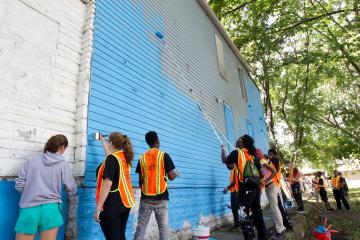
A personal reflection on summer youth employment programs

On June 29, 2020, J-PAL affiliates Sara Heller and Judd Kessler published an op-ed in The New York Times urging New York City Mayor, Bill de Blasio, and other mayors of major cities to fund summer youth employment programs (SYEPs) for the summer of 2020. After initially announcing the complete cancelation of SYEP for the summer of 2020, the City of New York announced the SYEP Summer Bridge Program, a $51 million public-private partnership to restore summer jobs for New York City’s youth. As part of the June issue of J-PAL North America’s monthly newsletter, Yiping Li, a Policy Associate at J-PAL North America, shared her personal experience with Chicago’s SYEP, One Summer Chicago. Sign up to receive our monthly newsletter here.
June typically marks the beginning of summer for students across the United States. This June is different. We are not only battling a global pandemic but also grappling with the virus of systemic racism in the United States.
Recently, I have been reflecting on my past summers as I think about what this time must feel like for students across the country, especially those from low-income households who may not have had access to remote learning opportunities in the wake of COVID-19. It was particularly disheartening to hear that New York City Mayor Bill de Blasio announced in April that this year’s NYC Summer Youth Employment Program would be canceled.
I grew up on the South Side of Chicago in a low-income household. While the neighborhood I lived in was safer than most, I knew the difference between the sound of fireworks and that of a gunshot. Prior to the launch of Chicago’s SYEP, One Summer Chicago, in 2011, I spent my summers mostly at home because there was not much to do in the community that didn’t come with a price tag. If I stayed home, my parents knew I would be safe when both of them were at work.
However, because of One Summer Chicago, I spent my summer of 2011 running the K-5 reading program at the library, which also doubled as a daycare for parents in the neighborhood who couldn’t afford childcare. I was suddenly caring for half a dozen children for hours every day while trying to get them excited about reading. Though I struggled in the beginning, over time, I learned to create a stimulating environment for the children by setting up multiple activity stations the children could rotate through to keep them engaged. I tapped into my experience as an immigrant learning English to come up with not just grade-level appropriate reading materials for native speakers but also more accessible choices for non-native speakers.
One Summer Chicago was a transformational experience in my life. It provided me with the opportunity to engage in a safe and meaningful activity during my summer. At the same time, the responsibility it bestowed on me allowed me to gain new skill sets such as event planning and time management. Interacting with all those children that summer was one of the reasons I ended up majoring in Developmental Psychology at college, which led to my discovering my passion for research.
Now at J-PAL, I find personal meaning in the research on the impact of SYEPs and the New York Times op-ed by our affiliated professors, Sara Heller and Judd Kessler, who led this research. They find that programs that provided minimum wage summer jobs to mainly disadvantaged youth in New York City and Chicago reduced arrests for violent crimes, incarceration, and premature deaths. Their results, and the fact that SYEPs have succeeded where other youth employment programs have not, suggest that SYEPs hold immense potential to alleviate the social costs of youth violence.
Given the benefits of SYEPs and my own positive experience with One Summer Chicago, it is my hope that other major cities will provide youth with the opportunity to participate in SYEPs this year. I was extremely heartened to hear that New York City recently restored summer jobs, and I hope other cities do the same.

